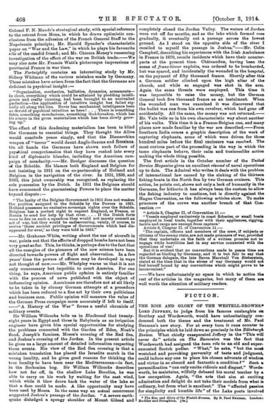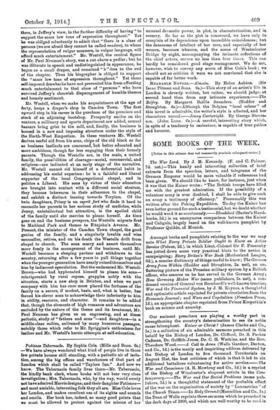FICTION.
THE RISE AND GLORY OF THE WESTELL-BROWNS.• LORD JEFFREY, to judge from his famous onslaughts on Southey and Wordsworth, would have unhesitatingly con- demned both the theme and the treatment of Mr. Paul Neuman's new story. For at every turn it runs counter to the principles which he laid down so precisely in the Edinburgh Review. What chiefly exasperated Jeffrey in the "This will never do " article on The Excursion was the fact that Wordsworth had assigned the beau role to an old and super- annuated Scotch pedlar. " What," he asks, " but the most wretched and provoking perversity of taste and judgment, could induce any one to place his chosen advocate of wisdom and virtue in so absurd and fantastic a condition?" Such a personification " can only excite ridicule and disgust." Words- worth, he maintains, wilfully debased his moral teacher by a low occupation. Again, " the arts that aim at exciting admiration and delight do not take their models from what is ordinary, but from what is excellent." The "affected passion for simplicity and humble life" of the Lake poets involved • The Rise and Glory of the Westell.Browns. By B. Pant Neuman. Laudon: Hodder and Stoughton. L68.]
them, in Jeffrey's view, in the further difficulty of having " to support the same low tone of expression throughout." Yet he was obliged reluctantly to admit that "there is a class of persons (we are afraid they cannot be called readers), to whom the representation of vulgar manners, in vulgar language, will afford much entertainment." Mr. Westell, the central figure of Mr. Paul Neuman's story, was a cut above a pedlar ; but he was illiterate in speech and undistinguished in appearance, he began as a small draper, and remained " h "-less to the end of the chapter. Thus his biographer is obliged to support the "same low tone of expression throughout." Yet these self-imposed drawbacks have not prevented him from affording much entertainment to that class of " persona " who have survived Jeffrey's shrewish disparagement of humble themes and homely sentiment.
Mr. Westell, when we make his acquaintance at the age of forty, keeps a draper's shop in Camden Town. The first upward step in his career is the purchase of the premises and stock of an adjoining bootahop. Prosperity smiles on the venture, a millinery and sports department are added, annual bazaars bring grist to the mill, and, finally, the business is housed in a new and imposing structure under the style of the North-West Emporium. In these ventures Mr. Westell derives useful aid from his sons, chips of the old block so far as business instincts are concerned, but better educated and more ambitious, though far less engaging than their homely parents. Though the Westells are, in the main, a united family, the possillilitiea of cleavage—social, commercial, and religions—are indicated at an early stage of the narrative. Mr. Westell cannot rid himself of a deferential habit in addressing his social superiors : he is a faithful and liberal supporter of the local Congregational chapel, and in politics a Liberal. His eons by virtue of their education are brought into contact with a different social stratum, they become lukewarm in their adherence to the chapel, and exhibit a distinct leaning towards Toryism. Of the twin daughters, Prissy is an esprit fort who finds it hard to reconcile her parents to her serious study of medicine, while Jenny, unintellectual but attractive, is the spoiled child of the family until she marries to please herself. As time goes on and the business prospers, the Westells migrate first to Maitland Park and thence to Fitzjohn's Avenue. Mr. Prescot, the minister of the Camden Town chapel, the good genius of the family, and a singularly lovable and wise counsellor, retires, and on his death the Westells drift from chapel to church. The sons marry and assert themselves more freely in the management of the business, until Mr. Westell becomes a sleeping partner and withdraws to the country, returning after a few years to pull things together when the younger generation have nearly ruined themselves and him by indiscreet speculation. But the undaunted Mr. Westell- Brown—who had hyphenated himself to please his sons— reinvigorated by rural repose, grapples nobly with the situation, starts a new shop in Brixton, and when we part company with him has once more placed the fortunes of the family on a secure, if modest, basis, and, what is better, has forced his clever sons to acknowledge their inferiority to him in ability, resource, and character. It remains to be added that, though the elements of high romance and adventure are excluded by the nature of the theme and its treatment, Mr.
Paul Neuman has given us an engrossing, and at times pathetic, study of "fathers and eons "—and daughters—in a middle-class maims, enlivened by many humorous passages, notably those which refer to Mr. Spriggins's enthusiasm for leather and Mr. Westell's heroic attempts at self-education.











































 Previous page
Previous page